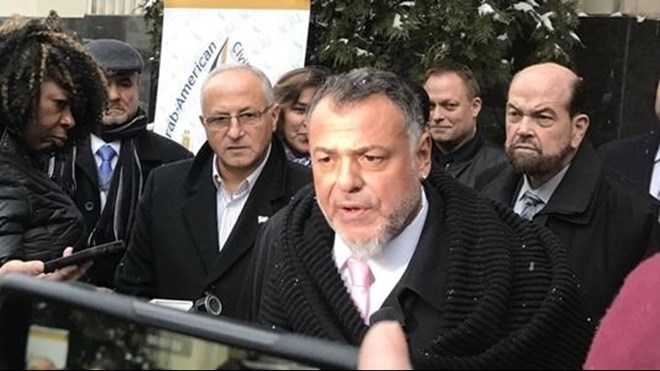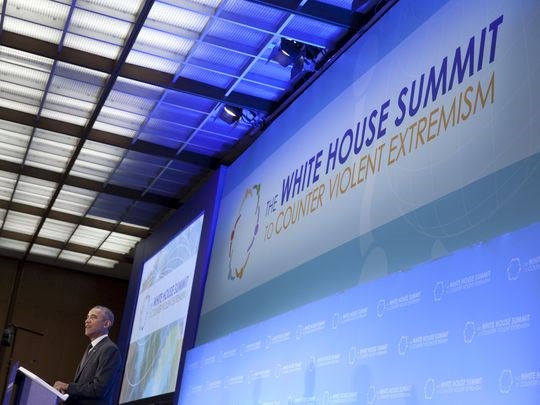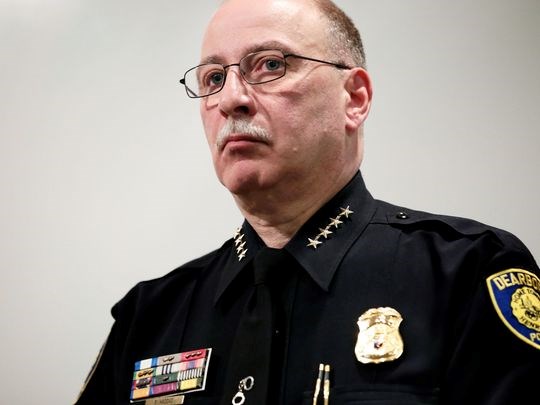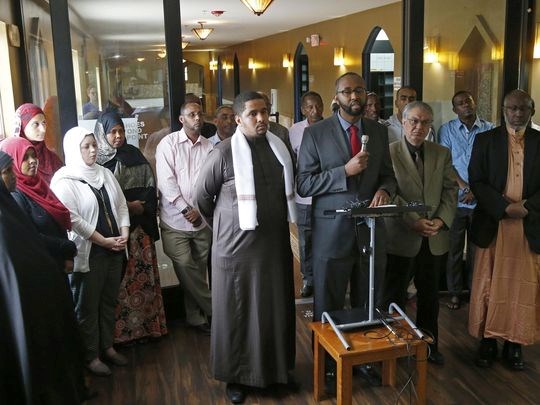Detroit Free Press
Monday September 17, 2018
By Niraj Warikoo
Michigan is one of four states to create "policy academies" to monitor and counter violent extremism.
Photo: Tresa Baldas, Detroit Free Press
The week before Donald Trump was inaugurated last year, the Department of Homeland Security (DHS) awarded a Lebanese-American group in Dearborn $500,000 as part of a government effort to counter violent extremism known as CVE. The department also gave Dearborn Police $51,000 as part of the program.
But the grants drew backlash from Arab-American and civil rights advocates who worried the money stereotyped Arab-Americans and Muslims and could be used for surveillance.
A week after Trump became president, the Dearborn group, Leaders Advancing and Helping Communities, formerly known as the Lebanese American Heritage Club (LAHC), turned down the half a million dollar grant. Other Arab-American and Muslim groups across the U.S., such as the Somali-American community in Minnesota, also turned down grants, saying they were being singled out for discussions about violent extremism.
“The protection of Michigan residents is our highest priority,” said Col. Kriste Kibbey Etue, director of the Michigan State Police and State Director of Emergency Management and Homeland Security. “This academy will allow us to work collaboratively to develop a comprehensive strategy to combat violent extremism and targeted violence.”
But the move has drawn concern from Muslim and Arab-American leaders who fear the money will be used to target them. Given Trump's rhetoric against Islam and his administration's travel ban on some Muslim-majority countries, they say the programs could be used in negative ways. Moreover, they say that the bigger problem is right-wing extremism, citing studies that show white supremacist and anti-government groups are committing more acts of violence.
Muslim Advocates, a civil rights group, filed a Freedom of Information Act (FOIA) request last month with the Department of Homeland Security, asking for details about the $500,000 grant it gave to the National Governors Association.
Juvaria Khan, a staff attorney with Muslim Advocates, said CVE programs are both ineffective and discriminatory, trying to link religious traits such as praying or style of dress to being a terrorist.
“CVE programs have long been known to unjustly target Muslim, black, and brown communities,”Khan said. “Under CVE, the daily activities many Americans engage in will be viewed with suspicion and potentially criminalized. This is especially true for American Muslims. We call on DHS to release any and all documents pertaining to these programs in Colorado, Illinois, Michigan, and Virginia so that Americans can understand how their communities are being affected."
Khan cited a study by the Brennan Center for Justice that 85 percent of the CVE program are targeting Muslim-Americans. She and others are concerned about the vague nature of the CVE plans in Michigan.
Ari Adler, spokesman for Michigan Gov. Rick Snyder, said that the state is receiving $10,000 as its part of the grant "and is currently under review for how to best use it."
"As I understand it, the grant does not focus on any specific groups or ideologies," Adler said.
In a statement in April after the governors association awarded the money, Snyder said: “Unfortunately, targeted violence continues to be a problem that plagues our nation. Being selected for this Policy Academy is an opportunity for Michigan to learn from subject matter experts and build partnerships with participating states as we further enhance our plans to prevent acts of violence driven by ideology."
But Nabih Ayad, a Detroit attorney who founded the Arab American Civil Rights League, said he's concerned that Arab-Americans are being targeted with the latest CVE program. He also worries about the role that Michigan State Police may play in the program given that its director, Etue, shared a Facebook post last year calling kneeling protesters like Colin Kaepernick "anti-American degenerates."
"I find it highly suspicious they gave this to the Governors Association, who then chose Michigan..which has a large Muslim and very diverse Arab-American population," Ayad said. "There's a concern they're going to be discriminatory and selective in their approach. ... There is no doubt they gave this money earmarked to be basically used against this group of people."
Ayad said the money could be used instead to promote more diversity in law enforcement.
Brittany Donald, spokeswoman for the National Governors Association, said "we are not targeting any particular group of individuals."
"Guiding our work is a firm commitment to respecting and protecting individual’s First Amendment rights."
She said "the goal of the policy academy is to help these states develop and implement evidence-based strategies for preventing ideologically motivated violence, regardless of whether that ideology is based on religion, nationalism, racism or any other set of beliefs."

President Obama speaks at the summit on countering violent extremism (CVE) in Feb. 2015 in Washington, D.C. (Photo: Carolyn Kaster, AP)
Abed Ayoub, director of legal and policy affairs at the American-Arab Anti-Discrimination Committee, said the CVE programs "function as surveillance tools. ... It's not effective in combating extremism."
"We're not surprised Michigan got selected," said Ayoub, a native of Dearborn. "Because of its high concentration of Arab-Americans and Muslims in Michigan, you can almost guarantee funding will include a component of surveillance."
Dearborn and CVE
In former President Barack Obama's last month in office, DHS gave a total of $10 million in CVE grants to various groups and law enforcement agencies across the U.S. to combat extremism, whether Islamic or right-wing or other types. The grants came as the rise of ISIS caused alarm; in February 2015, the White House had held a three-day summit on countering violent extremism.
But shortly after Trump took office, DHS canceled those grants pending a review. There was discussion that the Trump administration was going to focus only on Islamic extremism, according to a February 2017 report in Reuters.
A few months later, DHS then chose 26 groups for the $10 million in CVE grants, including $51,521 for Dearborn Police to conduct monthly training sessions for the public on how to detect potentially violent people and responding to active shooter situations.
Dearborn Police Chief Ron Haddad, who oversees police in a city with a sizable Arab-American Muslim population, has been working on CVE issues for years with the Department of Homeland Security. He said he spoke about restoring the money for Dearborn with John Kelly, previously the Homeland Security Secretary, when Kelly visited Dearborn in March 2017.
But Haddad added that he's uneasy with the phrase "Countering Violent Extremism."

Dearborn Police Chief Ronald Haddad during a press conference at the Dearborn Police Department on Thursday, April 28, 2016, in Dearborn. (Photo: Salwan Georges, Detroit Free Press)
"The title is inappropriate for the actual training," Haddad told the Free Press. "That title would infer there is a violent extremist culture that we're trying to go against."
Haddad said he and others have tried to get the name changed over the years, but were told by federal officials that's the way it was designated by Congress for the funding.
Haddad said the CVE program is not about spying or "sneaking up on mosques," but about building relationships and ties.
"Some people want to build a narrative we're spying on mosques and countering violent extremism ... which is not the case," he said.
Dearborn's grant money is used for monthly Community Training and Awareness Briefings (CTAB) that are held in community centers, schools, corporations such as Ford, and other places.
Dearborn Mayor Jack O'Reilly said there have been about seven cases over the years in Dearborn where early intervention helped defuse potential cases of violent extremism. A couple of those cases involved youths drawn to radical groups such as ISIS.
In a separate case in July, federal authorities said it had captured a former Dearborn resident, Ibraheem Musaibli, accused of joining ISIS in Syria.
Violence not limited to one group
But Mayor O'Reilly stresses that the issue of violence cuts across all groups and beliefs.
"There are young people who are reaching a point of no return and don't know what else to do," O'Reilly said, referring to incidents like mass shootings in schools. "You see it every day."
Regardless of whether Dearborn gets CVE grants in the future, O'Reilly said the city will continue to work with its diverse communities on making the city safe.
Haddad said that terrorism and Islamic extremism often get a lot of attention, but make up a tiny percentage of the violence in society.
"The 'terrorism' buzzword is a very emotional thing," Haddad said. "Since 9/11, it's changed all our lives. But when you look at the national crime index, you can't even find it" on the list of major incidents "because the crimes are so infrequent."
"It gets all the attention and the media talk about it, but when you look at the statistics ... it's so small, it doesn't show up on the page," Haddad said.,
Haddad said that referring to Dearborn when talking about
terrorism can be "causing more fear and paranoia" that's not grounded in
reality.
Jaylani Hussein, center, director of the Council on American-Islamic Relations-Minnesota, discusses the Somali community’s concerns about the Countering Violent Extremism program in Minneapolis. (Photo: Jim Mone/AP)
Another problem, say advocates, is that the Trump administration doesn't seem to be taking seriously the issue of right-wing extremism. A report released by two groups that monitor extremism, cited in a Washington Post report, showed there are almost 10 times as many Internet searches in the United States indicating support for right-wing and white supremacist violence compared with jihadist violence.
Last year, DHS rescinded a $400,000 CVE grant it had given to Life After Hate, which was founded by a former neo-Nazi who now tries to combat white supremacist violence. A government official told the New York Times it was rescinded after the founder had criticized Trump.
A spokesman for DHS would not comment on the FOIA request and concerns raised by Muslim advocates.
On its website, DHS said its CVE "projects work in a way that explicitly does not compromise the individuals’ privacy, civil rights, or civil liberties. ... Discrimination on any basis is both prohibited and antithetical to the purpose of these projects."